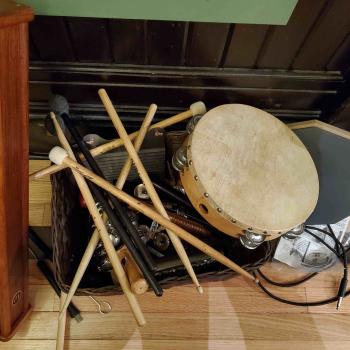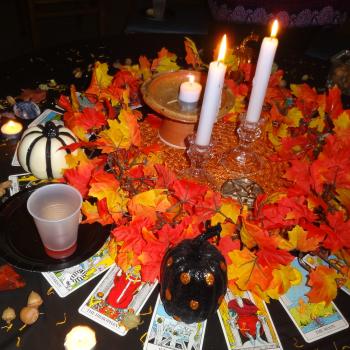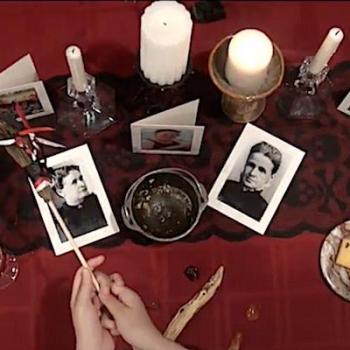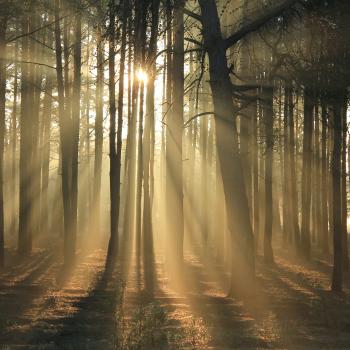For those of us who follow the Pagan Blogosphere (or who at least read The Wild Hunt with some degree of regularity), there are a handful of news stories that come in cycles. Controversies within our interconnected communities that re-appear so frequently that we cease to be surprised, although that never manages to ameliorate the stinging anger they produce. As sure as the cycle of the seasons themselves, someone is going to do something ill-advised at Pantheacon in February, some municipality with bad intent is going to bully a coven or temple, one or more radical feminists are going to take cruel pot-shots at trans women, and a representative of some large Heathen organization will cross the event horizon into bigotry.
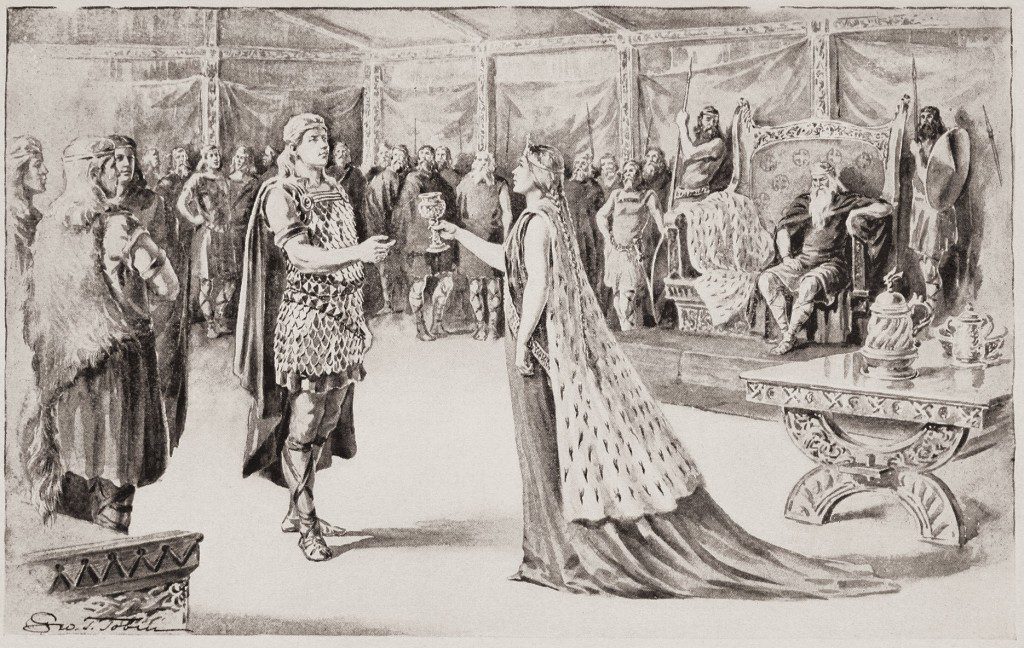
It is this last event which has recently reared its ugly head, but with a horrible new twist. The Asatru Folk Assembly (AFA), one of America’s biggest Heathen organizations, has for years hinted at supporting white nationalist ideology without endorsing it directly. But after a recent change in leadership, they appear to have given up on any pretense of hiding their bigotry. Last week, the AFA’s new Alsherjargothi released a statement of largely transphobic rhetoric, with a dog-whistle to white nationalism thrown in for flavor. This presents several problems to the larger Ásatrú and Heathen communities that have been discussed at length elsewhere. But in short, a lay person reading the AFA’s public statement could come to believe that Ásatrú and Heathenry are inherently bigoted and white racialist religions. For the many Heathens who work tirelessly to combat this stereotype, who try to run inclusive Kindreds, or who serve in the US or Canadian armed forces, this news is potentially catastrophic.
I myself am someone who spent years running away from Heathenry and a certain (very persistent) Norse Goddess because of this stereotype. And thanks to what I suspect is deliberate interference on Her part, this past month I found myself involved in the birth of a new Vanatru clan associated with the RedWood Vanatru Tradition. This has involved a lot of spiritually-intensive work on the part of myself and my newfound kin, during which time we’ve bonded quite a bit. So it only makes sense that in the aftermath of the AFA’s statement we would be talking about ways of handling one’s lineage without being a bigot. During this discussion, one of my clan siblings said something to me that stuck:
I appreciate how you respect your lineage and the special bonds it gives you but you don’t let yourself be restricted by those lineages nor are you trying to force others into that mold. Your way of handling your lineage bonds is great. And It might be interesting to talk about that more in depth, show one more way in which it can be done. It doesn’t invalidate non racist folkish ways, but it’s different from them.
What Heathen groups like the AFA do is equate ethnic lineage (or perceived “race”) with ability to be a member of a Heathen religion. Such a closed lineage would be termed folkish. To folkish Heathens, your ancestral line is an important bond between you and your Gods. More moderate folkish groups operate as Indigenous religions or some Judaic sects do: while their Heathenry is built largely closed along ethnic lines, there are ways to be adopted in. AFA, on the other hand, adopts a more extreme stance: Only cisgendered people with Teutonic blood can truly be Heathen.
The Filthy Mixed Blood Under My Lily-White Skin
In my view, the focus on skin pigmentation and claimed ethnicity as the ultimate link to one’s Gods is a load of bollocks. And while the “AFA celebrates our feminine ladies, our masculine gentlemen and, above all, our beautiful white children”, I’m not fool enough to think that my ancestry was ever that clear cut. To the casual observer, I look incredibly Irish. I could even go around claiming that I was of full Irish descent. But only 1/4 of my blood comes from Erin. I carry the blood of the cadet branch of a Norman Irish household, blood that originated in France and Wales. The bump in my father’s nose tells of our Iroquois ancestors, but not of the Frenchmen they married. The hair on my chest speaks of rural Italy, my soft blue eyes come from the German heartland (or was it Limerick?), and my reddish hair is undoubtedly from Scandinavian ancestors who lived, pillaged, and died on a foreign shore almost a millennia ago. Only a fool would claim a pure genetic lineage to anything, because there are no pure genetic lineages. The Vikings certainly didn’t think so, and I know my Norman ancestors didn’t think so either. And either way, I can say with absolute certainty that I had ancestors that worshiped the Æsir, the Áes Dána, the Religio Romano, the Christ, and the indigenous Gods of New England.
And you know who doesn’t care about my mixed blood? Áine, the patron Goddess of both families that make up the Gaelic portion of my bloodline. I’ve had the privilege to meet Her on multiple occasions. She presents Herself as surrounded by my ancestors, people whom She considers to be in Her charge. In this way, She calls to me and tells me of my genetic inheritance. She even introduced me to a favorite “child” of Hers named Joseph, whose joints made the same horrible sounds that my knees have started to make. For Her, 1/4 blood is more than enough to be Her kin, and I’m proud to consider Her the Patroness of my family. And do you want to know who else doesn’t care about my filthy mixed blood? Freyja. Glorious, beautiful, seductive Freyja. If She had held any second thoughts about me, She could have left after the second, third, or fourth time I ran away from Her screaming in terror. But no matter how hard I ran, I’d still find Her waiting around the next corner with open arms and calling me Her child. Clearly my mudblood doesn’t matter to my Deities, so why should it matter to anyone else?
Honoring The Ancestral Bond
How do I honor my ancestors? “Handle my lineage bonds”, as my clan sister phrased it? By loving them with a fervor and passion befitting a child of Freyja and Áine. I think about them with pride, even though I know but a fraction of their names. What stories of theirs I know I tell and embellish until they become a kind of legend. What legends I know I repeat so that they won’t be forgotten. I tell anyone who will listen about their exploits, their loves, their dreams, and their pain, so that they might continue to live. For I believe that each story, each heartfelt word is a kind of offering unto them. “What is remembered, lives”, so many of us Pagans repeat at the death of a respected elder, covenmate, or colleague. Well, I remember so that my dead may continue to live.
Let us remember…
Let us remember the Third Vermont Volunteers, who found themselves behind a cluster of trees in Gettysburg, Pennsylvania two days before they were due to be discharged from an otherwise uneventful tour of duty. Let us remember my great-great-great grandfather, who halfway through yelling “MORE AMMO!” got a hole punched clear through his face by a piece of cannonball shrapnel. Let us remember how for 60 years he donned his full Union dress uniform for Sunday church services, his scars covered by thick muttonchop sideburns.
Let us remember great-great grandpa McBride, who left behind parents and siblings in County Waterford as he set out to make his fortune in America. Let us remember how he worked as a gardener and a landscaper on a rich man’s estate, how his son became a doctor’s chauffeur, his grandson a carpenter, his great-grandson a teacher, and his great-great grandson a Pagan blogger of minimal note. Let us remember his father, who died in a warm bed in County Waterford at the age of 103, pipe still in his mouth. Let us remember his grandson, who died in a warm bed in Westchester County at the age of 83, charred cigarette still in his the ashes of his bedsheets.
Let us remember my great-uncle, a toddler crushed to death by an automobile in the driveway of his home. Let us remember his bereaved sister, who was unfairly blamed by their mother because she had gone out (with permission) to celebrate her sixteenth birthday. Let us remember how she would be shunned by her siblings, cursed by a cruel world, and eventually left divorced with child. And then let us remember how she, my grandmother, died: seventy-four years later, beloved, surrounded by her husband of 60 years and four generations of the family that she forged with her own blood and sweat.
And because I’m not done yet. Because there are still ancestors and kin to be honored. Because I need to stick it in the eye of every AFA bigot who wants to spout off about their “masculine men and feminine ladies”: I honor my great-great uncle, a gay Roman Catholic priest who killed himself in despair. I honor my brother-in-law, who had been assigned female at birth. I honor my dear clan sister, who had been assigned male at birth. And I silently honor others, direct living relatives by blood and by marriage, who are as queer and gender nonconforming as the day is long.
And that, dear readers, is how I honor my ancestors.
A New Way Forward
Whenever perennial controversies such as this one arise, the online Pagan community dutifully comes together to deal with it. Like Sisyphus with his boulder, we relive the cycle: We grieve. We cry. We get really angry. And yes, leaders emerge to help us forge a path forward. And forge forward we do, because for each iteration of these controversies that I can recall, dedicated individuals have responded by working within their communities to create a better way.
In the aftermath of yet another Heathen controversy, I find myself thinking on the lore of runes. There, Hagalaz (ᚺ) represents the hailstone. Like ice from the sky, Hagalaz brings destruction and chaos, flattening crops and damaging buildings. But hailstones are also called “the coldest of grains”. To Heathen eyes, they can be viewed as the blueprint for life itself, a microcosm of the primordial ice from which the world was born. And so, while terrible, Hagalaz is the seed for the new creation that will spring forth from the hail-flattened fields. And for Heathens such as myself, that is where find ourselves today, surrounded by the chaos caused by ancestor veneration and tribal pride gone bad.
For Unitarian-Universalists, this is an opportunity to help build bridges. Reach out to the Heathens in your communities, the ones who are struggling to deal with an unwanted image as racists and bigots. Let them know that you want to be an ally, and that you understand that bigots like the AFA aren’t representative of a vibrant and diverse religious movement. If you’re part of an active CUUPS chapter, let them know that you can provide them with a home that affirms the worth and dignity of them and others, and that you’re always willing to listen. And support the efforts of those Heathens and Asatruar who are trying to write a new chapter for their religious movements, one free from the shackles of bigotry and small-mindedness. Help spread their messages, so that seekers and laypeople can see that there is more to Heathenry than what the AFA wishes there was.
If we work hard and plan carefully, Heathenry can grow anew from the opportunity that AFA’s hailstones have produced. As Unitarian-Universalists, we can be allies in their, and my, fight. But remember — as certain as tomorrow’s sunrise, and no matter how hard we work, these same issues will once again resurface with more nuance, and the process will begin yet again. May we all have the strength to whether this storm and the ones to come, as well as the blessings to grow from each of them.








